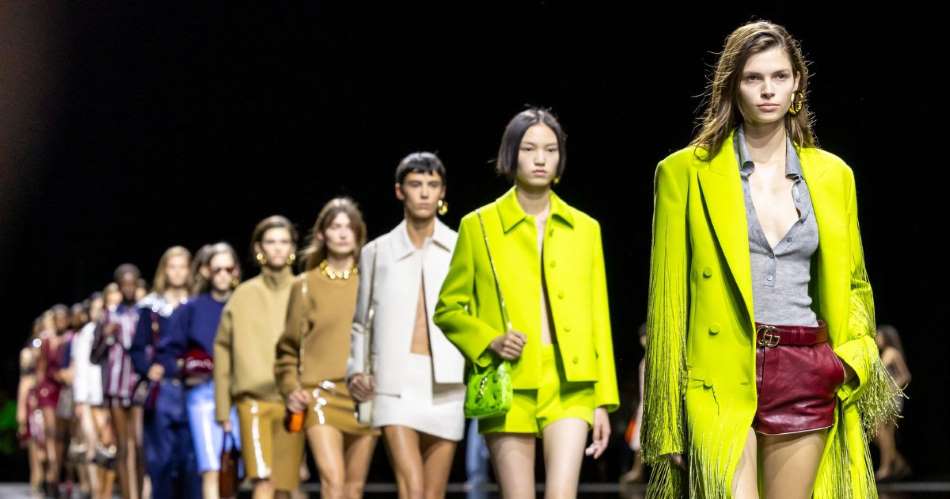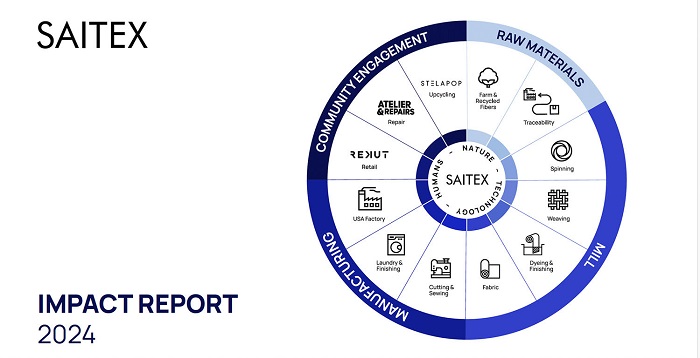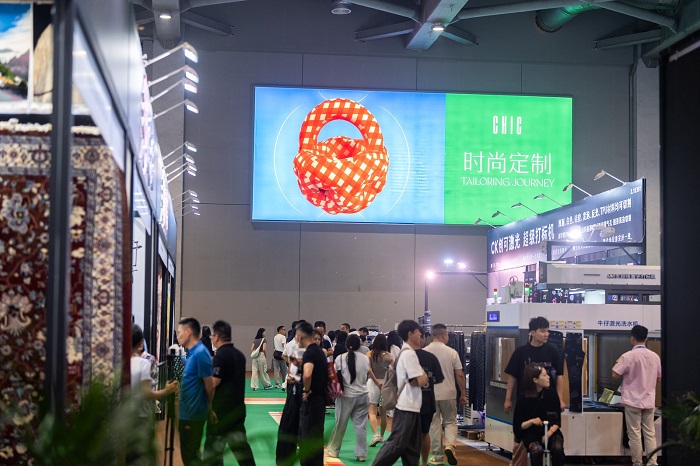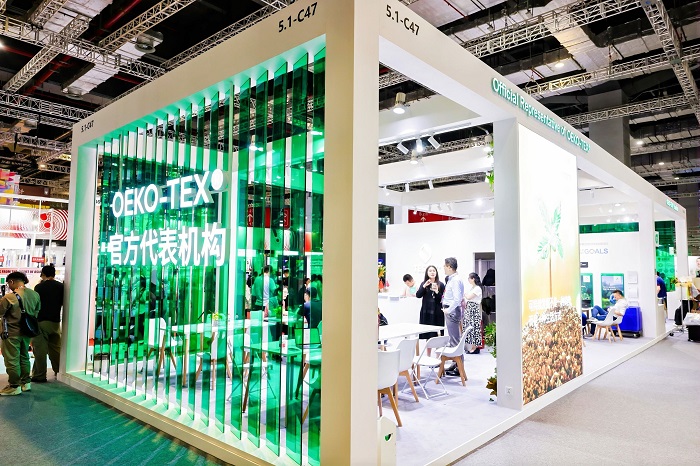FW
Birla Cellulose, a leading Man-Made Cellulosic Fibers (MMCF) producer under Grasim Industries Ltd., has clinched the top spot in Canopy's Hot Button Report 2023. This marks the fourth consecutive year that Birla Cellulose has received the prestigious 'Dark Green Shirt' rating, highlighting its unwavering commitment to preserving ancient and endangered forests and championing circular solutions. The Hot Button Report, issued annually by Canopy, a non-profit environmental organization, serves as a crucial tool for fashion brands in evaluating MMCF suppliers' forest fiber sourcing practices.
H.K. Agarwal, Managing Director of Grasim Industries Ltd., expressed pride in Birla Cellulose's recognition, emphasizing the company's dedication to sustainable wood sourcing, forest conservation, innovation, and transparent operations. The company actively collaborates with global MMCF producers to support the Convention on Biological Diversity's goal of conserving 30% of terrestrial ecosystems by 2030.
Birla Cellulose remains a leader in industry collaboration, working closely with key stakeholders, including Canopy, Fashion for Good, and Circular Fashion Partnership, to drive circularity in the fashion sector. Nicole Rycroft, Executive Director of Canopy, congratulated Aditya Birla for their consistent efforts in removing ancient and endangered forests from the MMCF supply chain.
Canopy's Hot Button Report is recognized as an essential guide for fashion brands seeking responsible sourcing from MMCF producers committed to biodiversity and deforestation mitigation. With over 550 global brands prioritizing partnerships with environmentally conscious producers, this signifies a significant industry shift towards sustainability, reflecting a collective annual revenue of over US $1 trillion. The 'dark green shirt producer' ranking, achieved by Birla Cellulose, underscores the highest adherence to CanopyStyle requirements, emphasizing conservation, transparency, traceability, and next-generation solutions.
Birla Cellulose, as the pulp and fiber business of the Aditya Birla Group, operates 12 environmentally efficient sites globally, employing closed-loop technologies and recycled materials for sustainable MMCF production. The company's fibers, derived from renewable wood, contribute to a lower carbon footprint and resource consumption. Active collaboration with upstream and downstream partners further amplifies Birla Cellulose's positive impact on the sustainability of its value chain.
Concerns arise among textile and garment manufacturers in Coimbatore and Tiruppur as investors shift away from Tamil Nadu to other states. This migration not only poses a risk of losing investments and capacities but also threatens the expertise within the textile industry, warns Palaniswamy, a garment manufacturer.
Integrated garment units in Tamil Nadu are expanding to states like Madhya Pradesh and Bihar, while some significant players outsource orders to cut production costs, redirecting business to West Bengal and other northern states. Rising power and labor costs, coupled with the need to procure raw materials externally, make Tamil Nadu's textile industry less competitive, notes K Selvaraju, Secretary General of the Southern India Mills' Association (SIMA). He suggests that these factors might lead to the closure of 30% of textile mills in the state in the future.
To counter these challenges, Prabhu Dhamodharan, Convenor of the Indian Texpreneurs Federation, emphasizes the need for the state government to modernize the textile industry and enhance competitiveness. Reducing production costs is also crucial for the industry to reclaim its share in the yarn export market, he adds.
Spanish clothing retailer Mango is set to double its US store count to 40 in the coming year, as revealed by Cesar de Vicente, Global Retail Director. The National Retail Federation anticipates a 4 per cent growth in US retail sales during the November-December holiday season, with shoppers benefiting from significant promotions and bargains.
Mango experienced double-digit sales growth during the recent Black Friday and Cyber Monday events, leveraging its expansions in the US, Italy, and India, along with the global 50 per cent discounts both in-store and online. Anticipating similar growth during upcoming Cyber Week sales, Mango relies on its in-house design, a strong focus on party wear, and retail expansion to compete with emerging players like Shein, as stated by de Vicente.
Exceeding pre-pandemic levels by 13per cent, Mango reported sales of €2.68 billion ($2.8 billion) last year. In the first half of this year, the brand's sales grew by 30 per cent over pre-pandemic levels, reaching €1.4 billion.
The forthcoming International Abit Congress, scheduled for November 2024, will take place in Salvador, Bahia. The previous edition, held from November 8-9, 2023, at the Federation of Industries of the State of Santa Catarina (Fiesc), attracted over 400 attendees. The Congress delved into the significance of fostering new collaborations to enhance competitiveness within the industry.
Themed 'Networks, Connections, and Boundaries,' the event focused on diverse strategies essential for the industry network's growth. Topics included discussions on the 'future of retail,' 'emerging technologies,' and 'ESG initiatives.'
Cem Allan, President of IAF, led the opening panel discussion, outlining plans for the sector and delivering a lecture on the theme 'Market: From Boundaries to Bridges.' This session featured insights from Henry Costa, Director at Renner, and Tiago Inácio Peixoto, CEO of Cataguases.
The first day concluded with the launch of the Fashion and Climate Guide, a collaborative initiative between Abit, ABVTEX, and SENAI CETIQT, aimed at decarbonizing the textile and apparel industry.
The second day commenced with a lecture by Luiz Alberto Marinho, Managing Partner at Gouvêa Malls, discussing the consumer at Omniera. The closing lecture, emphasizing the shared responsibility of sustainable practices in the industry, was delivered by Rachel Maia, CEO of RM Consulting.
The 81st Plenary Meeting of the International Cotton Advisory Committee (ICAC) is set to draw over 400 delegates from 35 countries. Hosted by the Ministry of Textiles at Mumbai's Jio World Convention Centre from December 2 to 5, 2023, the event is held in collaboration with the Cotton Corporation of India (CCI), the Confederation of Indian Textile Industry (CITI), and the Cotton Association of India (CAI). Piyush Goyal, Union Minister of Textiles, Commerce & Industry, and Consumer Affairs, Food & Public Distribution, will inaugurate the meeting.
The four-day event will bring together government representatives, industrialists, business delegates, scientists, and researchers from various cotton-producing and consuming nations. Themed "Cotton Value Chain: Local Innovations for Global Prosperity," the Plenary Meeting will foster discussions on productivity, climate resilience, circularity, and locally developed cutting-edge technologies for sustainability.
Topics on the agenda include 'Technologies to Increase Productivity,' 'Climate-smart Innovations as Game Changers for Cotton Production,' 'Recent Impactful Technological Advances,' 'Industry 4.0 for Textiles: Smart Manufacturing,' 'Global Efforts in Branding Sustainability and Quality Assurance,' 'Genetics, Diversity to Enhance Cotton Productivity,' 'Cotton and Climate Resilience,' and 'Technological Innovations for Global Collaborations.'
The event provides a platform for the Indian industry to showcase its strength, growth, and resilience. Case studies, success stories, and innovative practices of small and marginal farmers will be shared, emphasizing local initiatives to enhance productivity and sustainability, including breakthroughs in carbon sequestration, pest management, advancements in water management, quality assurance, and traceability. The Plenary Meeting will be followed by a Technical Tour in Ahmedabad from December 06-08, 2023, showcasing the industry's journey from farm to fashion.
Hyosung, alongside leading seamless companies Tefron and Santoni, unveiled a new line of sustainable sportswear and seamless garments at the ISPO Munich trade fair (November 28-30, 2023).
Santoni showcased a new collection crafted with Hyosung's certified, eco-friendly yarns, including creora® Bio-Based elastane and 100% recycled creora® regen elastane. Additionally, they introduced their new SM8-TOP2ST machine for advanced seamless design and sculpted terry patterns.
Susie Barak, Business Director at Tefron, emphasizes the synergy of their seamless knitting expertise with Hyosung's yarns, leading to innovative designs and styles. Simon Whitmarsh-Knight, Global Marketing Director-Textiles at Hyosung, highlights the collaboration's benefits: not only does it offer traceable, certified fibers, but it also unlocks new possibilities for design innovation and versatility.
Myanmar is set to host the Zhejiang International Trade Exhibition led by China in Yangon this December. The exhibition will showcase 25 Chinese apparel brands and over 100 manufacturers, garnering support from Japanese and South Korean trade associations.
Tadaki Kawae, Advisor to the Japan Garment Manufacturers Association, notes approximately 70 per cent garment factories in Myanmar are owned by international companies. The Japan Garment Manufacturers Association is dedicated to generating 600,000 new jobs in Myanmar.
The Myanmar Garment Manufacturers Association records 330 registered Chinese-owned companies, surpassing the numbers from South Korea (70) and Japan (20). Despite this, global fashion giants like H&M and Zara have already halted their sourcing from Myanmar due to allegations of labor law violations.
The Ministry of Textiles is set to gauge the expansion of circular textile industry by monitoring the trade of products crafted from regenerated fibers. To facilitate the effective management of such product trades, the ministry is in the process of establishing distinct tariff codes, referred to as HSN (harmonised system of nomenclature) codes. These codes aim to assist customs authorities, policymakers, and trade organizations in enhancing their oversight of the trade in these products. Moreover, they play a pivotal role in ensuring adherence to sustainability standards and certifications.
These initiative aligns with the Circular Economy Action Plan of the European Union, introduced in 2020. This plan is designed to tackle sustainability challenges within the textile industry by evaluating both pre- and post-consumer waste generation and pinpointing its sources.
Chandrima Chatterjee, the Secretary General of the Confederation of Indian Textile Industry (CITI), emphasizes this move will provide a distinct identity to the recycling segment. According to the IMARC Group, India's textile recycling market, valued at $308.7 million in 2022, is projected to reach $375 million by 2028. The market is anticipated to grow at CAGR of 3.4 percent from 2023 to 2028.
In a crucial move towards combating forced labor in Xinjiang, National Council of Textile Organizations (NCTO) President and CEO, Kim Glas, has endorsed U.S. Representative Jennifer Wexton's call for intensified isotopic testing of imported products containing cotton sourced from forced labor in China.
Wexton's letter to Department of Homeland Security (DHS) Secretary Alejandro Mayorkas emphasizes the need for bolstering U.S. Customs and Border Protection's (CBP) capability to detect such imports using isotopic testing technology. The appeal follows a Reuters report revealing positive results for Xinjiang forced labor in cotton imports tested by CBP’s current contracted company, albeit with a limited 86 samples at a cost of $1.3 million.
Wexton, a staunch advocate for enforcing the Uyghur Forced Labor Prevention Act (UFLPA), particularly targets Shein, a prominent fast-fashion company currently eyeing a U.S. IPO. The letter proposes scaling up isotopic testing as a strategic tool in UFLPA enforcement, urging DHS to implement a six-month test program.
Wexton seeks a comprehensive report explaining the underutilization of isotopic testing in UFLPA enforcement, reviewing CPB's testing costs, exploring alternative testing providers, and assessing the isotopic expertise within the DHS and CBP workforce. As the U.S. endeavors to eradicate forced labor, Wexton's letter emphasizes the moral and legal imperative for DHS to lead the charge in dismantling such supply chains.

McKinsey’s 2024 ‘State of Fashion’ report points towards significant uncertainty looming over the global fashion industry. Prevailing sluggishness in global economic growth and unabated inflationary pressures signal a challenging landscape. With consumer confidence remaining pessimistic, if not weakened, leaders in the fashion industry are now confronted with the imperative task of pinpointing ‘pockets of value’ and uncovering ‘new performance drivers’.
The trajectory of the fashion industry in 2024 is intricately tied to the collective repercussions of its performance in 2023. A year marked by persistent and escalating challenges, the US and Europe have proven to be slow markets throughout, while China displayed promise in the initial half, only to experience a substantial downturn in the latter part.
Demand fluctuations need resilience
Looking to 2024, the industry braces itself for the impact of the tumultuous demand fluctuations witnessed in recent years. Such times of uncertainty often trigger a ‘bullwhip effect’ in supply chains, wherein minor variations in sales lead to heightened volatility. This, in turn, results in factory underutilization, workforce layoffs, and delayed investments in infrastructure.
Navigating through this intricate web of challenges will require resilience and adaptability from global fashion industry. The identification of innovative strategies to uncover value and the pursuit of novel performance drivers will be paramount in steering the industry through the uncertainties that lie ahead. The interconnected nature of global markets underscores the need for a comprehensive understanding of the multifaceted factors influencing the industry's trajectory.
Luxury to continue leading the sector
In 2024, the luxury segment is poised to retain its position as the primary generator of profits, although the growth outlook has moderated in the range 3 to 5 percent. This marks a notable decline from the robust 5 to 7 per cent growth in the preceding year, signaling a tempering of the post-pandemic optimism that characterized 2022 and 2023.
The US, identified as the globe's preeminent luxury market, is anticipated to exhibit a modest year-on-year growth of 2 to 4 per cent in 2024. This projection represents a slight improvement compared to the 1 per cent growth observed in the first half of 2023. Confidence levels among fashion executives, respondents to the study, reveal a lukewarm growth outlook in the US, Europe, and China. Notably, 51 per cent expressed optimism about promising growth prospects in the Middle East, while 39 and 34 per cent harbor similar sentiments for India and the Asia Pacific region, respectively.
The overarching forecast for the global fashion industry points towards a top-line growth of 2 to 4 per cent in 2024. However, it is acknowledged that economic growth disparages globally, leading to regional variations in the predicted growth rates. While Europe and China are expected to maintain subdued performance, the anticipated upturn in the American economy may act as a catalyst for growth there.
Price increase on the agenda
The State of Fashion 2024 report reveals 69 per cent executives plan price increases (1-5 per cent) to counter ongoing inflation. Interestingly, 198 per cent consider holding ticket prices steady, while 12 per cent anticipate a decrease (1-5 per cent) prioritizing inventory movement over profits. Looking ahead, 71 per cent of executives aim to boost sales in 2024, up from 63 per cent the previous year. The industry's net intent to raise prices is 50 per cent, with 69 per cent of executives planning increases (up from 58 per cent). Success in implementing price hikes is expected through a precise and tailored approach, as outlined in the report.
Sustainable models to become strategic priorities
Sustainability, according to the report, is the green field of opportunity as well as the biggest challenge brands can expect in 2024. Around 21 per cent stated their brands are looking towards a balanced implementation of sustainability through scaled improvements, risk reductions and gaining competitive edge through investing in new-age textiles. However, 12 per cent executives aren’t necessarily feeling the optimism as not only rising regulatory pressures from local governments but also the scale of the task of restricting towards greater sustainability in uncertain times poses huge financial implications. And 12 per cent site sustainability as their identified ticket to success in 2024.
The report also covers a slew of other points that will have a significant impact such as the upcoming economic headwinds, fashion systems, influences and prominent trends.












